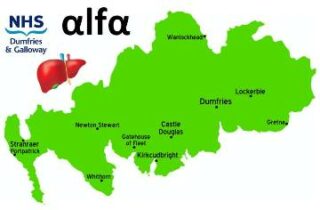Q Exchange
An Alcohol related Frequent Attender (ALFA) community nursing team
- Proposal
- 2022

What is the challenge your project is going to address and how does it connect to the theme?
Frequent attendance to A&E is a cycle of dissatisfaction, and offers no real improvement for alcohol dependent (ALFA) patients.
We plan to develop a person-centred service combining expertise in mental (addiction) and physical (liver) health, local knowledge and people with lived experience. We will co-design and test better ways for patients to avoid crisis situations which trigger emergency attendance.
Combining QI experience with Consultant level liver disease specialism, we will bring a positive change to ALFA patients.
With one large hospital in Dumfries and Galloway – a region that is more than 100 miles long, the project will explore creative approaches using digital communication tools including ‘NHS Near Me‘ and alcohol management apps across professional groups and mutual support groups, who may be a distance apart, yet support each other with creative ideas, supported with skilled digital facilitation by an ALFA nurse.
What does your project aim to achieve?
The project will improve the lives of patients who have alcohol problems and do not engage with conventional healthcare and other community services but frequently attend (typically when in a crisis) hospitals through A&E leading often to emergency hospitalisations.
Using qualitative research and the benefit of an early experience with a similar setup, the project will co-design a service with frequent attenders involving community resources and assertive outreach. This will allow a more patient focussed and individualised care for patients with multiple severe disadvantages and complex needs including mental health (addiction) and physical health. Development of such a service will directly reduce inequities, will improve the engagement of ALFA patients with other services and will decrease the use of healthcare resources in overstretched A&E departments, medical assessment units and hospitals.
How will the project be delivered?
A programme of Virtual knowledge management sessions will be designed – to ensure that the support community including community nursing, community based social prescribers and community pharmacists have the right knowledge and can follow pathways to access the right level of support.
These sessions, based around the ECHO model will consist of consultant-led learning melded with MDT case-based discussions, and time for healthcare workers to discuss, network and support each other.
The stakeholder group will include experts in digital inclusion, to stimulate thinking and to test ideas for self-help and for continuing support, with a view to reducing A&E visits and improving the lives of those affected.
Participants form the core stakeholder group. From this group, we plan to create an ALFA nursing team – a centre of excellence with a culture of co-design – working with patients to explore real-world solutions to better manage and reduce A&E dependence.
How is your project going to share learning?
The theme of virtual knowledge management sessions runs through the core of this project. Measures will determine the competence and confidence of the healthcare people involved, and those emerging as leaders will be offered ‘specialisation’ time to take on higher levels of knowledge relating to liver disease, and to share this knowledge using technology based learning, specifically, following the ECHO style of virtual knowledge movement.
We believe that by using virtual means to connect conversations, we can create a culture of organic sharing amongst peers in the community. This will be fortified through the projects dedicated website as well as Quality Improvement related conferences.
The project will publish on a dedicated website learning experiences and will endeavour to present their experience and data at national and international meetings to allow wider learning from this important project specifically designed to improve health inequities for this most vulnerable patient group.
How you can contribute
- Examples of digital tools used by people in the community to better manage alcohol dependence
- Examples of successful approaches to networking and knowledge management across nursing peer groups
Plan timeline
| 1 May 2022 | Data analysis for frequent A&E attendees across region |
|---|---|
| 15 May 2022 | Local proposal for ALFA nurse hosting |
| 30 May 2022 | Job description and advertisement for seconded nurses |
| 31 May 2022 | analysis and procurement plan for virtual toolset |
| 24 Jul 2022 | Commencement of 2 x ALFA nurse secondees |
| 30 Oct 2022 | Report and replan every 3 months |